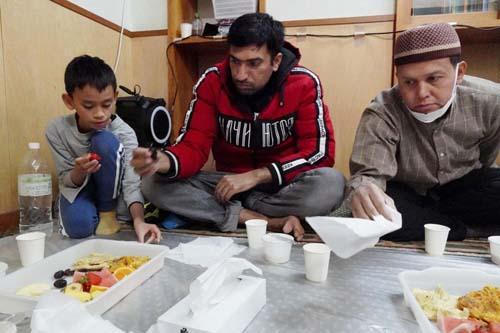
Muslim children in Japan fast despite challenges
Takehiro Michishita
Tokyo: From late March to late April, many Muslims living in Japan observed Ramzan, a holy period of the year in Islam that involves a month of fasting during daylight hours, joining fellow believers in other countries around the world.
For some children, it meant refraining from eating their favorite snacks while figuring out ways to keep their minds off food, such as spending school lunchtimes reading books in the library.
Ramzan, the ninth month of the Islamic calendar in which followers of the faith abstain from all food or drink from sunrise to sunset, including water, is one of the most important events of the year for Muslims.
The duration of the fast, which also includes prayer and community activities by followers of the faith, is determined by the phases of the moon, which is why it began in late March this year.

Very small children, people who have fallen ill and women who are menstruating are exempt from fasting. But as young kids grow older, many will often start doing so for short periods of the event, based on their willingness to participate and whether they are developed enough to do so.
Shortly after 6 p.m. on April 15, dozens of Muslims gathered at a mosque in Nagoya, central Japan, for “iftar,” the evening meal after sunset when people break their fast together.
Yasin Rehan, 8, who was born in Egypt and is now a third-year student at a public elementary school in the city, was one of them.
Munching on dates with other participants, he said, “The meal is 100 times tastier than usual. I am glad I stuck with it.”
Yasin began fasting in earnest this year, eating lunch at school on some days but skipping it on others. Yasin’s father, Ibrahim, 39, said that although fasting might come naturally to his son since he has Muslim parents, he is happy that “he started voluntarily.”
A 9-year-old fourth grader in Nagoya, who was born and raised in Japan but has Indonesian parents, ate school lunch as usual while avoiding all other snacks and drinks.
“He is still small and may feel awkward if he fasts alone in his class,” the boy’s mother, 42, said. “He is trying to strike a balance in his own way. I’d just like him to practice fasting as he grows.”
At the Kurono Elementary School run by the municipal government of Gifu, roughly 10 percent of about 380 students can trace their roots from outside Japan, with around 20 having fasted during Ramadan this year.
“The other students accept the practice as it is, and are learning the importance of mutual understanding and diversity,” Eiji Hori, the assistant principal, said.
The school opens its library for Muslim students at lunch breaks during Ramadan and also recommends they sit out of physical education, suggesting they instead observe the class for health reasons.
But for students who must work while studying, Ramadan can be a particularly trying period.
Samad Abdus, a 28-year-old Bangladeshi auto shop worker in Nagoya, struggled to adapt to life in Japan. Unlike in his home country, Ramadan is not celebrated or practiced by the whole of society, making adapting to the new mealtime schedule while living in Japan difficult.
“Here, everyone lives normally and it was hard to get used to it,” he said.
There were some days when he did not have time to eat as a vocational student because he was also working a late-night part-time job.
During summer, there have been cases of people falling ill due to anemia caused by fasting, according to the Japan Indonesia Association for Economy Cooperation in Tokyo.
The number of Muslims living in Japan is increasing. An association official said they try to provide information on the difficulties of fasting in Japan to Muslims residing in the country. They also ask that other people accept and respect their right to observe the religious practice.
